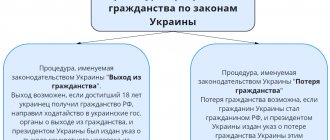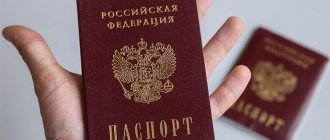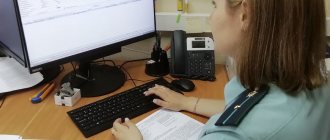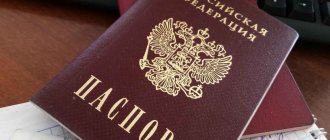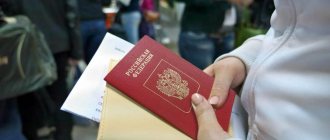Citizenship is one of the basic institutions of the constitutional and legal sector. Its meaning is two-sided. This is due to the fact that, on the one hand, citizenship acts as a way and means of protecting a person, his rights, legitimate interests and freedoms, and on the other hand, with the help of citizenship the foundations of the state are protected. The importance of having such an institution in the legal system of each country is due to the continuous process of globalization of modern society, the blurring of boundaries between sovereign entities, and the creation of numerous international associations. Acquiring citizenship is an important issue for every foreigner or stateless person living on the territory of the Russian Federation, having a source of income here and connecting their future with this country. On the other hand, some people who have Russian passports are interested in the problem of severing all legal ties with the Russian Federation. Let's consider how the acquisition and termination of Russian citizenship is carried out, what is the meaning and significance of this institution of constitutional law.
What laws govern the acquisition of Russian citizenship
The procedure for obtaining Russian citizenship is regulated by federal laws, regulations and some international agreements.
- Federal Law of May 31, 2002 No. 62-FZ “On Citizenship of the Russian Federation”
- Decree of the President of the Russian Federation of November 14, 2002 No. 1325
- Decree of the President of the Russian Federation of April 24, 2019 No. 183
- Decree of the President of the Russian Federation of April 29, 2019 No. 187
- Decree of the President of the Russian Federation of September 14, 2012 No. 1289
- Federal Law of February 19, 1993 No. 4528-1 “On Refugees”
- Federal Law of July 25, 2002 No. 115-FZ “On the legal status of foreign citizens in the Russian Federation”
- Decree of the Government of the Russian Federation dated July 22, 2014 No. 690
- Order of the Ministry of Labor of the Russian Federation dated July 13, 2015 No. 446n
The main international treaty is the agreement of February 26, 1999 between Kazakhstan, Belarus, the Russian Federation and the Kyrgyz Republic on a simplified procedure for acquiring citizenship.
What it is?
The legal definition of the term “citizenship” is contained in the Federal Law “On Citizenship of the Russian Federation”. In Article 3 of this normative document, this concept is defined as a stable, as well as legal connection of a person with the Russian Federation, which is expressed in the presence between these two entities of a set of mutual powers and responsibilities. This connection is called stable because one of the principles of this institution is its inalienability and stability, the ban on deprivation of citizenship. In addition, such relations between a person and the state are legal, since they are regulated by legislation. I would like to note the fact that the acquisition of Russian citizenship leads to the emergence between a specific person and the country of not only mutual powers and obligations, but also responsibility.
The legal basis of this institution is not only the Federal Law mentioned above. Basic provisions affecting the grounds for acquiring Russian citizenship are enshrined in the Basic Law - the Constitution. Also, the fundamental principles on which this legal institution is built contain the norms of international law. It is important to note that citizenship is a right, not a responsibility of a person; it is a measure of possible behavior that is aimed at realizing a person’s interests. From a moral point of view, having citizenship of a certain country means a feeling of belonging to one’s own people, to a certain country. In addition, it increases the feeling of significance and patriotism.
Grounds for acquiring Russian citizenship
You can acquire Russian citizenship by birth, you can also accept it, and also restore it.
- By birth.
If a child was born in the Russian Federation and at least one of his parents is a citizen of the Russian Federation, the child has the right to citizenship of the Russian Federation by birth. If a child was born in another country, and both or at least one of his parents is a citizen of the Russian Federation, the child also has the right to Russian citizenship by birth. - Acceptance of citizenship.
A foreigner can accept Russian citizenship on a voluntary basis, having fulfilled all the requirements of the legislation of the Russian Federation. - Restoration of citizenship.
Those people who already had Russian citizenship, but moved and became a citizen of another state, can apply for the restoration of Russian citizenship.
Russian citizenship can be obtained through a simplified or general procedure. This does not affect citizenship by birth.
What are the principles of citizenship?
The legal institution we are considering is built on fundamental, basic principles that are generally recognized and enshrined in international documents. The first of the principles is that all methods of acquiring citizenship enshrined in Russian legislation are equal to each other. It does not matter whether a person acquired this status by birth or as a result of rooting, because the scope of powers and responsibilities granted to all subjects is the same for everyone. The second most important characteristic of citizenship is its inalienability. It lies in the fact that no one can be forcibly deprived of this status. It is also impossible to prohibit a person from changing his affiliation with a particular state, since this connection between a person and a country is free.
It should also be noted that Russian citizenship is extraterritorial - this is a legal connection, not a factual one. This means that living outside the country is not grounds for severing ties with Russia. It is also important that a person who has a Russian passport cannot be deported outside the Russian Federation, and equally cannot be extradited to a foreign state. Another principle is that the Russian Federation encourages stateless persons who live in the territory of this country to acquire citizenship. All these fundamental provisions are enshrined in Article 4 of the Federal Law “On Citizenship of the Russian Federation”. Also, some of these rules are enshrined in the basic law - the Constitution. All legal regulation of this institution is built on these basic principles.
Who will not be given citizenship
To become a Russian citizen in the general manner, you first need to obtain a TRP (temporary residence permit), then a residence permit. Only then will you have the right to apply for citizenship. If this sequence is violated, your application will be refused. Also, the application will not be accepted if an incomplete set of documents is submitted along with it. In addition, applicants who:
- They advocate changes to the Constitution of the Russian Federation or create a threat to the security of the Russian Federation. This may include attempts to violently seize power, an attack on the life of a politician, or calls for these actions.
- Participate or have participated in armed conflicts, participated in terrorist attacks and their preparation in relation to citizens of the Russian Federation or representative offices of the country abroad.
- Participate or have participated in extremist activities, disclosure of state secrets, military mutiny or espionage.
- Restricted entry into Russia due to the fact that they were subjected to deportation or expulsion from the country.
- They provided false information about themselves and submitted false documents.
- Serve in law enforcement, army or security agencies of another state.
- Have an outstanding or unexpunged conviction for intentional crimes.
- Criminally prosecuted for crimes.
- Convicted and in prison.
- They refuse to take the oath.
Is it possible to cancel the decision to terminate Russian citizenship?
After making a positive decision to renounce Russian citizenship, it will no longer be possible to simply cancel it, but the applicant will still have the opportunity to restore the lost status. To do this, you will need to live in the Russian Federation for at least 36 months; within 12 months you can travel outside its borders for a period not exceeding 90 days. After this, those interested will be able to submit an application for a Russian passport.
As for minors who lost their status following their parents/guardians/adoptive parents, upon reaching adulthood they still have the opportunity to restore their lost rights.
The recovery procedure is the same for everyone, regardless of the failure scheme, standard or simplified.
Is there a quota for citizenship of the Russian Federation?
There are no quotas for Russian citizenship. But there is a current quota for temporary residence permits (TRP).
A temporary residence permit allows a foreigner to legally live and work in Russia. Most often it is issued for a period of 3 years, but it can also be issued for another period.
For example, if a minor receives a temporary residence permit, the permit will be given for the same period as that of his parent, if a military person - it will be given for the period of military service.
A temporary residence permit without a quota can be obtained by a foreigner who:
- Born in the RSFSR and was a citizen of the USSR,
- They have a child or parent who is a citizen of the Russian Federation living in Russia.
- A minor who has a foreign parent living in the Russian Federation.
- Receives a residence permit together with a foreign parent.
- Recognized as a native speaker of Russian.
- He was subjected to illegal deportation from the territory of the Crimean Autonomous Soviet Socialist Republic.
- He is a highly qualified specialist.
- Works for more than six months in a profession from a special list.
- Received full-time education at a Russian state university.
- He is a participant in the state program for the resettlement of compatriots.
- He is married to a Russian citizen and permanently resides in Russia.
If a foreigner does not meet one of these conditions, he can obtain a temporary residence permit under a quota.
Every year, government authorities decide how many quotas to allocate this year and how to distribute them among regions. For example, in 2020, 60,300 quotas were allocated for temporary residence in Russia. Of these, 2000 went to Moscow, 1500 to St. Petersburg. Quotas fill very quickly, so it is best to apply at the beginning of the year.
Grounds and methods of termination
Chapter 3 of Federal Law No. 62 establishes the following grounds (methods):
- Renunciation of citizenship;
- Other circumstances.
The latter should be provided for either by the legislation of the Russian Federation (No. 62-FZ) or by treaties between Russia and other countries. For example, as provided in Art. 21 of the Law, in the event of a change in the borders of the Russian Federation, citizens have the right to choose for themselves whether to remain in the previous position of Russians or change it in favor of another country.
Voluntarily
Voluntarily belonging to the state in Russia ceases as a result of a person’s personal choice or when state borders change.
The rules for voluntary exit are regulated by Chapter 3 of Law No. 62. This procedure provides for:
- General order.
- Simplified.
In addition, there is a procedure for the loss of the corresponding position by a minor at the request of the parents or one of them (Part 3 of Article 19). In this case, simpler conditions apply.
Forcibly
Actually, this cannot be done forcibly. The right to belong to the state is protected by the Constitution of the Russian Federation. But at the same time, the state has the right to annul the decision to admit Russian citizens to the ranks in cases established by law.
That is, only a review of the decision to acquire citizenship can be considered forced deprivation. This is possible only if deliberately incorrect information is provided about the identity of the citizenship acquirer or if the Oath is not taken (Article 22).
You may also like
1
Finding suitable work with temporary residence permits in the Russian Federation
3 139
How to obtain Russian citizenship in the general manner
Documents for Russian citizenship are generally accepted and reviewed by the President. The procedure is as follows: first you need to obtain a temporary residence permit, then a residence permit and then you can apply for citizenship. Before applying for citizenship, you must live with a residence permit for five years.
Who can receive
Foreigners who:
- Continuously reside in Russia for five years on the basis of a residence permit.
- They promise to comply with the Constitution of the Russian Federation and are ready to voluntarily accept Russian citizenship.
- Officially employed or have another legal source of income.
- They speak Russian and have a special document confirming this. This could be: a certificate of proficiency in Russian, a diploma from a university in Russia or the USSR, a school certificate.
What does recognition of citizenship mean?
In accordance with the legislation of the Russian Federation, the connection between the state and people - citizens of the former Soviet Union who permanently resided on the territory of Russia on the day the relevant federal law came into force - is automatically recognized. The only exceptions were those who, within one year from that moment, declared their unwillingness to acquire a legal connection with this state. Thus, the acquisition of citizenship as a result of its recognition is a process that was implemented once, mainly on the day the Federal Law “On Citizenship of the Russian Federation” came into force. It is characterized by the lack of active actions on the part of people who want to establish this legal connection with the state.
How to obtain Russian citizenship in a simplified manner
When obtaining Russian citizenship through a simplified procedure, a residence permit is usually not required. In cases where it is still needed, the period of residence in Russia is reduced from 5 to 3 years, and sometimes to 1 year. It depends on the background of the citizenship applicant. The documents are reviewed by the Ministry of Internal Affairs within 3-6 months.
The new law on simplified acquisition of citizenship is a decree of the Russian president defining new categories of people who have the right to apply for Russian citizenship in a simplified manner. According to the decree, residents of certain areas of the Lugansk and Donetsk regions of Ukraine have the right to do this (the LPR and DPR are currently located there). The processing time for applications is up to 3 months.
Who can receive
Citizenship of the Russian Federation can be obtained in a simplified manner by adult foreigners, their disabled or incompetent adult relatives, for example, disabled people and pensioners, as well as their children.
An application for citizenship of the Russian Federation is considered within up to 3 months if it is submitted by:
- A person who was born and permanently resided in Sevastopol or Crimea, but left there for some reason before March 18, 2014.
- A citizen of Ukraine or a stateless person permanently residing in the Lugansk and Donetsk regions of Ukraine as of April 27, 2014 and April 7, 2014, respectively. He must have: a temporary residence permit or residence permit, a refugee certificate, a certificate of temporary asylum in the Russian Federation or a certificate of a participant in the State program to assist the voluntary resettlement of compatriots in the Russian Federation.
- A person who was subjected to illegal deportation from the territory of the Crimean ASSR.
- A person whose relatives were subjected to illegal deportation from the territory of the Crimean Autonomous Soviet Socialist Republic.
- Citizen of the Republic of Iraq, the Republic of Afghanistan, the Syrian Arab Republic and the Yemen Republic, born on the territory of the RSFSR and formerly a citizen of the USSR.
- Parent, spouse or child of the citizens listed in paragraph 5.
- Resident of certain areas of the Lugansk and Donetsk regions of Ukraine (LPR and DPR).
- A citizen of Kazakhstan, Belarus or the Kyrgyz Republic who meets one of two additional conditions. The first option is that the person was a citizen of the Kazakh SSR, Byelorussian SSR, Kyrgyz SSR or RSFSR and at the same time a citizen of the USSR and was born or lived on the territory of the Russian Federation before December 21, 1991. The second option is that a close relative of the applicant has Russian citizenship and permanently resides in Russia. Close relatives here include: spouses, children, parents, grandparents, sisters, brothers and grandchildren.
An application from an adult foreigner will be considered for up to 6 months if he:
- Citizen of the Republic of Kazakhstan, Belarus, the Republic of Moldova or Ukraine.
- Has at least one parent who lives in Russia and has Russian citizenship.
- A former citizen of the USSR who lived or lives in one of the former republics of the Soviet Union, but did not receive citizenship in it and therefore does not have it at all.
- Born in the RSFSR and had USSR citizenship.
- Married to a citizen of the Russian Federation for 3 or more years.
- He is married to a citizen of the Russian Federation, lives on the territory of Russia and has common children in this marriage.
- Has an adult able-bodied child with citizenship of the Russian Federation.
- Has a child who lives in Russia and has Russian citizenship, but the second parent, a citizen of the Russian Federation, has died, has been declared missing by the court, has limited legal capacity or incapacity, has been deprived or has limited parental rights.
- Has an adult but not able-bodied child, and the second parent, a citizen of the Russian Federation, has died, been declared missing by the court, limited in legal capacity or incompetent, limited in parental rights or deprived of them.
- Received vocational education after July 1, 2002 and was officially employed in Russia for 3 or more years.
- Works in Russia as an individual entrepreneur for 3 or more years.
- Owns a share in the authorized capital of a Russian legal entity of at least 10% for 3 or more years. In this case, the size of the authorized capital of a legal entity must be 100 million rubles or more.
- Officially working in Russia in a profession from a special list of specialists for at least one year.
- Permanently resides in the Russian Federation and is recognized as a native speaker of the Russian language.
- Disabled, moved to Russia from one of the countries of the former USSR and registered at his place of residence before July 1, 2002.
- Veteran of the Great Patriotic War, former citizen of the USSR, who now lives in Russia.
- Participates in the state program for the resettlement of compatriots.
Citizenship of the Russian Federation is issued in a simplified manner to incapacitated adults and children if:
- One of the parents or the only parent of the child is a citizen of the Russian Federation,
- A citizen of the Russian Federation took the child under guardianship or established guardianship over him or an incapacitated adult,
- The child or incapacitated adult is in a special Russian organization for orphans and children left without parental care, a medical organization or an organization providing social services.
Citizens of Kazakhstan, Belarus and the Kyrgyz Republic can obtain citizenship under a simplified procedure if the applicant meets one of the conditions:
- Was a citizen of the Kazakh SSR, Byelorussian SSR, Kirghiz SSR or RSFSR and at the same time of the former USSR;
- Born or lived in the RSFSR before December 21, 1991;
- In the Russian Federation, he has close relatives who have Russian citizenship: a spouse, a child, a brother or sister, one of the parents, a grandmother or grandfather, a granddaughter or grandson.
What is an option?
The grounds for acquiring citizenship include the opportunity to acquire a Russian passport as a result of changing the country's border and adding new territories to it. In the event that any lands change their state affiliation, the people living on them have the opportunity to change their citizenship. The term "option" comes from the Latin "optatio", which means "desire, choice". An option can be either active (requiring active action on the part of a person); and passive (when a person is required to either consent to a change in affiliation with the state, or inaction). As a rule, no special conditions are required for this. As a rule, children follow the citizenship of their parents upon option.
Citizenship of the Russian Federation under the program of resettlement of compatriots
The Russian Federation has a state program for the resettlement of compatriots living abroad. It is aimed at helping former Russians, citizens of the USSR and their relatives move to live in Russia and obtain Russian citizenship in a simplified manner.
It is not possible to move to all regions under the resettlement program. For example, Moscow and St. Petersburg are inaccessible to immigrants. But, you can move to the Leningrad region and most other regions of Russia from the Caucasus to the Far East.
At the start, a compatriot needs to obtain a certificate of participation in the resettlement program. It is issued in Russia and abroad for a period of 3 years. To obtain such a certificate, you must submit an application for participation in this resettlement program. In Russia - to the department of the Main Department of Migration of the Ministry of Internal Affairs at the place of registration or at the place of temporary location. Abroad - to the representative office of the Ministry of Internal Affairs of the Russian Federation, the Russian consulate or diplomatic mission.
When a compatriot becomes a participant in the program, he has the right:
- Do not pay customs duties when transporting property to the Russian Federation.
- Temporarily reside in Russia outside the quota system, and obtain a residence permit and Russian citizenship in a simplified manner.
- Get education: higher, secondary, general and preschool.
- Receive free medical care.
- Receive social services.
- Receive assistance in employment and job search.
- Receive compensation for moving expenses and payment of state fees for processing the necessary documents.
- Receive “lifting” money for initial arrangement in the amount of about 240,000 rubles.
- Receive a monthly allowance for the entire period of job search and employment in the amount of the subsistence minimum. The duration of this support does not exceed 6 months.
What is the legal status of citizens of the Russian Federation?
Let's consider how the situation of persons with a Russian passport differs from foreigners. It is legislatively established that citizens of other countries, as well as stateless persons, enjoy the same scope of rights as citizens of the Russian Federation. They also bear responsibilities on an equal basis with Russians. However, these provisions relate more to the personal rights and responsibilities of people. As for political powers, their range is much wider for citizens of the Russian Federation. So, for example, only a citizen has the right to vote (to participate in elections both as a candidate and as a voter). Only this category of people can take part in referendums. Citizens are subject to the obligation to perform military service. It should be noted that only people with Russian passports can enjoy all social benefits and free medical care. In addition, there are restrictions for foreigners regarding the acquisition of ownership of land plots located on the territory of the Russian Federation.
Russian citizenship for native speakers
A native Russian speaker is a foreign citizen who speaks Russian fluently. Bearers receive citizenship under a simplified scheme; the application review period is up to 6 months.
To become a carrier, you need to undergo a special interview and meet one of the following conditions:
- Permanently reside in Russia.
- Have relatives in a direct ascending line who live or have lived in Russia on a permanent basis: parents, grandparents, great-grandparents.
Citizens of Ukraine and the Republic of Belarus can be recognized as native speakers without an interview if three conditions are simultaneously met:
- Fluency in the language.
- Personal submission of an application for recognition as native speakers of the Russian language.
- They or their relatives in a direct ascending line permanently reside in Russia or previously resided in Russia, the USSR or the Russian Empire.
This decision is made by the Ministry of Internal Affairs.
If you decide to undergo such an interview, first you need to go to a preliminary conversation and submit an application to a special commission of the Ministry of Internal Affairs. The commission will set a date for the interview, and after successful completion, will issue a decision on recognition as a native speaker of the Russian language. The interview is free.
Termination procedure
This procedure in Russia is provided for by Chapter 3 of Law No. 62-FZ (voluntary) and Chapter 4 (forced).
Voluntarily
You should be aware that voluntary termination cannot be achieved if:
- Legislative obligations to the Russian Federation have not been fulfilled;
- The person is accused of a criminal offense or has been sentenced in a criminal case;
- A person does not have and is not expected to belong to another state.
In these cases, the person will have to remain in the current situation until the problems preventing renunciation of citizenship are resolved.
This is done voluntarily as follows:
- By filing a petition (general view);
- By registration (a simpler type of exit).
In the latter case, it is necessary that the applicant has a child or parent who is a citizen of another state, or that the person has left for permanent residence in another territory (and formalized this according to legally established rules, including international treaties).
Forcibly
Deprivation of an acquired position is forcibly carried out by the President (or another authorized body). After consideration by the specified person or body of the decision on conferring citizenship and recognizing it as invalid, the person is deprived of the corresponding position.
Termination of citizenship, like acquisition, is carried out under the conditions established by current legislation. It is possible both voluntarily - with personal expression of will, changing the borders of the state or a statement from parents (in cases of minors), and compulsorily - as a result of detection of the submission of false information when acquiring citizenship or failure to take the Oath of the Russian Federation. The law also establishes a number of circumstances that prevent the renunciation of belonging to the state.
Russian citizenship by birth
A newborn becomes a citizen of the Russian Federation if:
- Both parents or the only parent have Russian citizenship.
- One of the parents has Russian citizenship, and the other is stateless or declared absent.
- He was born in Russia, with one of his parents having Russian citizenship and the other having foreign citizenship.
- He was born in Russia, but his parents are foreigners, and the state of the parents does not grant the child its citizenship.
If a child was born in Russia and his parents are unknown, he becomes a Russian citizen after six months, provided that during this time his parents have not been found.
Renunciation of citizenship for minors
If the procedure for termination of citizenship is initiated for a minor, then the corresponding application is signed by both parents, and his birth certificate is additionally provided. In cases where one of the parents is a foreign citizen, his consent to renounce Russian citizenship in any form must be attached to the standard package of documents.
Children aged 14 to 18 years old sign the application independently.
Upon adoption, a child retains Russian citizenship until both of his adoptive parents apply for termination of his citizenship.
List of required documents
In addition to the application, you must submit the following package of documents:
- Child's birth certificate.
- Child's passport (if available).
- Documents from the authorities of a foreign state confirming the issuance of citizenship, or the possibility of obtaining it as quickly as possible.
- Identification documents of parents.
- Certificate of residence in a foreign country for at least one of the parents (irrelevant if the passport contains a note about the place of residence).
- Consent to terminate the citizenship of children aged 14 to 18 years, certified by a notary.
- Three photographs 3.5x4.5 centimeters.
- Receipt for payment of the consular fee.
All of the above documents are submitted only with mandatory translation into Russian. The consulate confirms the accuracy and correctness of the translation.
Citizenship of the Russian Federation for citizens of Kazakhstan, Belarus and the Kyrgyz Republic
Citizens of Kazakhstan, Belarus and the Kyrgyz Republic receive citizenship in a simplified manner if one of these conditions is met:
- They had citizenship of the Kazakh SSR, Byelorussian SSR, Kyrgyz SSR or RSFSR and at the same time of the former USSR and were born and lived in the Russian Federation until December 21, 1991;
- In the Russian Federation they have a close relative - a spouse, children, one of the parents, brothers, sisters, grandmother, grandfather, granddaughter or grandson - and he is a citizen of Russia.
Who decides citizenship issues?
Now that we have examined all the grounds and procedure for acquiring citizenship, it is important to establish which state institutions have the authority to resolve such issues, as well as to reveal their competence. Thus, the bodies that deal with issues of citizenship include:
- The president. Firstly, he is authorized to provide political asylum. Secondly, it is the President of the Russian Federation who decides issues regarding registration of citizenship.
- The federal body that is in charge of internal affairs issues, as well as its territorial bodies. Their scope of competence includes accepting applications related to citizenship issues from persons who reside in the Russian Federation, considering them, and making decisions on them (under a simplified procedure). They are also authorized to issue Russian passports if the response to applications is positive.
- The Ministry of Foreign Affairs has diplomatic missions, as well as consular offices that are located outside the state border of the Russian Federation. They resolve similar issues with the Ministry of Internal Affairs - they also accept and consider applications related to these issues, but only from people living outside the Russian Federation.
It should be noted that the activities of all the above bodies should be aimed at protecting the interests of citizens, observing the constitutional principles of the institution of citizenship, as well as protecting the state, its sovereignty and the integrity of the territory, preventing conflicts based on nationalism and intolerance.
Step by step procedure
- Existence of the right to terminate.
It is impossible to renounce Russian citizenship if a person has unfulfilled obligations to the state or is charged as a defendant in a criminal case. - Clarification of the scheme for termination of citizenship.
This depends on the person's place of residence. A simplified procedure is applied for foreigners. For Russians - general. - Preparation of documents.
The main document is an application, which indicates: motive for application, personal data, nationality, marital status, education, information about work for 5 years, presence/absence of a criminal record, passport data, information about minor children. A whole list of documents is attached to the application:- Russian Federation passport and/or international passport.
A passport of another state, if the person has already received its citizenship.
- Education document.
- Certificate of change of surname, if such a fact took place.
- Certificate from the Federal Tax Service confirming the absence of debts.
- Three black and white photographs 3x4.
- Receipt for payment of state duty.
- Submission of documentation to the competent authorities.
People living in the Russian Federation provide documentation to the division of the Main Directorate for Migration Issues of the Ministry of Internal Affairs.Persons staying abroad for a long time do not need to travel to Russia. The papers are submitted to the institution in which they are consularly registered.
The application with accompanying documents is submitted in person. After submitting the papers, a certificate is issued stating that the application has been accepted.
Under the simplified procedure, additional papers are provided: a permit issued to a person by a foreign state for the right to reside on its territory; certificate of deregistration at the place of residence.
The application must be filled out carefully: without errors or blots, in compliance with the rules of the Russian language.
Attention! An application and accompanying documents that are not properly completed will not be accepted for consideration and will be returned to the applicant.
Use a ballpoint pen to fill out the form. The list of attached documents must be neat: without damage or bruises. If a person has submitted forged documents or indicated knowingly false information in them, this serves as grounds for rejecting the application.
We describe in detail the stages of the procedure for renouncing Russian citizenship in this material.

